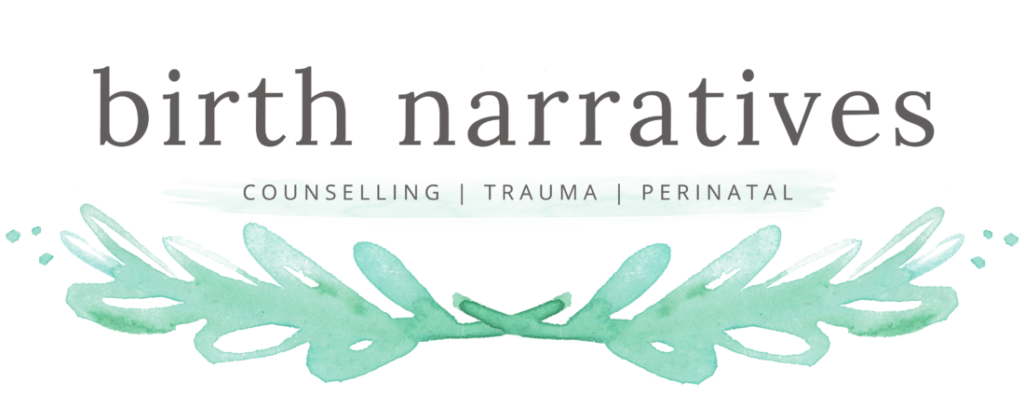What is birth trauma?
Birth trauma is in the eye of the beholder (Cheryl Beck). There is no ONE thing that we define birth trauma by. Approximately 40% of people feel their birth was traumatic or disappointing in some way, with a small percentage of those people developing PTSD. Some examples of what may cause birth trauma: you may have felt in danger, your baby was in danger, you had a pre-term baby or pre-eclampsia, you had a lot of interventions or none and still feel traumatized. You may have felt you were not listened to or cared for in a safe way. Old traumas may have been opened up by the birth and you were caught off guard by this. Birth trauma varies depending on the birth and the person experiencing it. You may also not use the word ‘traumatized’ but rather feel disappointed or let down by your experience.
Many people describe feeling trauma, disappointed, or scared during the birth or the postpartum period.
Why seek help?
- You are hearing the message ‘healthy baby is what matters’ and it doesn’t feel right
- You are feeling triggered by social media posts about birth, other people’s births, or other memories of your own birth
- You birth was physically and emotionally overwhelming, it has been difficult to process
- You experienced infant loss or miscarriage
- You are experiencing postpartum depression or anxiety
- You experience jealousy or anger when hearing birth stories
- You have difficulty telling parts of your story
- Your baby had a NICU stay
- You had pre-eclampsia, prolapsed cord, pre-term labor or other medical concerns
- Telling your story in a social setting has been a negative or discounting experience
- You want someone to listen to help you process this important birth trauma story
- There were unexpected/unwanted medical interventions
- You are preparing for another birth and are still struggling with experiences from a previous birth
- You feel disappointed/traumatized about your birth experience
- You had a transfer from a home birth to a hospital birth
- The pain and intensity of birth was overwhelming and unexpected
- You are experiencing symptoms of Post Traumatic Stress Disorder
- You were present at a birth and this experience is difficult for you in any way
Birth story listening is a way to change the culture of the way we tell birth stories and the way we listen to birth stories… without judgement, without comparisons and with total compassion for the journey. When this happens, a shift in the way we view birth happens. A shift that does not vilify a medical system, person or place blame on self… but a shift that allows the person who is struggling to move forward into a new view of themselves as a mother, father or birth professional. A shift that allows people to notice things about the birth that helps move forward in to new territory of healing. “After a birth, parents may initially feel grateful and accept what happened. However, weeks, months or even years later, they may find that doubts and negative feelings erupt. They may try to talk about it, to sort it out, but often can’t find a sympathetic ear. Or they may find someone to commiserate with, but shared anger and helplessness don’t heal the emotional trauma.”
(taken from Birth Story Medicine, August 2, 2013).
What happens in counselling?
- It is based on Narrative Therapy, EMDR, Solution Focused Therapy and Birthing From Within teachings
- It is a way to bring new meaning and/or healing to what you experienced
- We may use talk therapy or EMDR therapy in our work, so you can move through something you feel stuck on, vivid memories, triggers, or avoid thinking about because it is too painful
- Learn ways to cope with flashbacks
- Feel supported with triggers: anniversary of the birth, birthing again, etc.
- Find a different way to tell your story than you have told it in the past
- Reframes the birth experience
- Helps some of the moments you are stuck on to become less intense or distressing
- Work on an upcoming birth, addressing fears and feeling less anxiety
Information on Trauma Counselling:
“Why do people suffer from PTSD?”
-
The brain is not able to process the trauma memory in the same way that it would with normal memories. “In a frightening situation, the body floods with the stress hormones adrenaline and cortisol, which disrupt the function of the hippocampus, a part of our brain responsible for memory processing and consolidation.” It then becomes a trauma memory, which has different qualities than other memories. It is not a fully processed memory and so our brain gets ‘tricked’ into thinking the same situation is happening again when we get triggered by things like social media, seeing the hospital, the one year birthday, someone else’s birth story, or other reminders. This is a trauma memory and there are ways in therapy to integrate it into our (Birth Trauma, Kim Thomas).
All birth trauma services are available in-person. For more information, contact Shannon Kane at birthnarratives@shaw.ca or 403-880-2367
